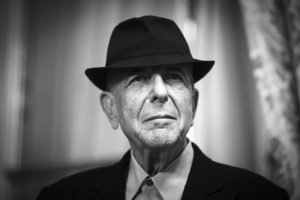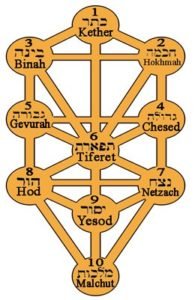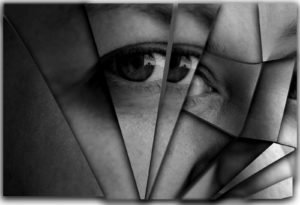Thank you, dear Leonard...
Mystic Mondays November 21, 2016 I was late to the party when it came to Leonard Cohen. In fact, I only heard of him for the first time when hearing the Jeff Buckley version of Hallelujah in about 2007. In the next few years I think I bought six CD's of Cohen's music and the DVD version of his "Live in London" performance. At the time I also didn't know that he had spent years in a Buddhist monastery and become a Buddhist monk himself. But I knew that his haunting and playful lyrics had a soulful, spiritual, even religious, quality to them. I swore that I could feel the same Presence underneath his music that I relied on when preaching.Leonard Cohen died on November 7--the day before the election. I don't know if he had an inkling of what was to come and just wanted out, but I do know that a quiet prophetic truth would have poured out of him. Cohen had that ability to name hidden realities that most of us can feel but not quite name. Hallelujah is probably his most popular example:
I was late to the party when it came to Leonard Cohen. In fact, I only heard of him for the first time when hearing the Jeff Buckley version of Hallelujah in about 2007. In the next few years I think I bought six CD's of Cohen's music and the DVD version of his "Live in London" performance. At the time I also didn't know that he had spent years in a Buddhist monastery and become a Buddhist monk himself. But I knew that his haunting and playful lyrics had a soulful, spiritual, even religious, quality to them. I swore that I could feel the same Presence underneath his music that I relied on when preaching.Leonard Cohen died on November 7--the day before the election. I don't know if he had an inkling of what was to come and just wanted out, but I do know that a quiet prophetic truth would have poured out of him. Cohen had that ability to name hidden realities that most of us can feel but not quite name. Hallelujah is probably his most popular example:
I've seen your flag on the marble arch,But love is not a victory march,It's a cold and it's a broken hallelujah.
"Broken hallelujah." Was there ever a more perfect description of the complex nature of life? Beauty and brokenness. Heaven and hell. Creation and Fall. I listened to the last interview he gave this fall in the final weeks of his life. David Remnick of The New Yorker conducted the interview while Cohen was in great pain and in his usual reflective, self-effacing form. I wasn't surprised when Remnick told Cohen that many of his songs sounded like prayers and wondered whether Cohen had intended any religious meaning. Cohen quickly dismissed the idea, but then added that subconsciously themes from his Jewish tradition couldn't help but to seep into his writing. Then he said this about the mystic tradition (Kabbalism) of Judaism:
I listened to the last interview he gave this fall in the final weeks of his life. David Remnick of The New Yorker conducted the interview while Cohen was in great pain and in his usual reflective, self-effacing form. I wasn't surprised when Remnick told Cohen that many of his songs sounded like prayers and wondered whether Cohen had intended any religious meaning. Cohen quickly dismissed the idea, but then added that subconsciously themes from his Jewish tradition couldn't help but to seep into his writing. Then he said this about the mystic tradition (Kabbalism) of Judaism:
One of the great themes of Kabbalistic thought is the repair of God. God, in creation the world, dispersed itself. The Creation is a catastrophe. There are pieces of him or her or it that are everywhere, in fact. The specific task of the Jew is to repair the face of God. The prayers are to remind God that it was once a harmonious unity.
Wow!Does that turn your theology on its head or what? In much of Christianity God is perfect, the world is a catastrophe, and God takes the responsibility to heal the world. In Kabbalistic Judaism it is God who is broken and we who have the responsibility to put God back together again like Humpty Dumpty who had a great fall! I am thinking about this in light of this election and the feeling among many of us that a great earthquake has shook us and torn the moorings from our cultural, political and spiritual boats. We are all trying to make sense of this and come to terms with it in our own ways. I have heard from some who have fallen back on their faith and reminded us that "God is in control." We may be in for a real mess, but we can always depend on the God of the heavens to ultimately take care of things in His own time and in His own way.I do understand this faith. When life becomes more complex than our little brains can handle there is a threshold where we give up trying to have answers. There is a place of trust where we let go and say, "God's got this one because I sure can't figure it out."But as you know I have been inching my way closer and closer to the mystical arms of our religious traditions. It started with experiences for which I had no words. It then led me on a pilgrimage of discovery of Rumi, the late Persian poet in the Islamic Sufi mystic tradition. And recently I have discovered the long lost Christian mystics of the Orthodox faith.
I am thinking about this in light of this election and the feeling among many of us that a great earthquake has shook us and torn the moorings from our cultural, political and spiritual boats. We are all trying to make sense of this and come to terms with it in our own ways. I have heard from some who have fallen back on their faith and reminded us that "God is in control." We may be in for a real mess, but we can always depend on the God of the heavens to ultimately take care of things in His own time and in His own way.I do understand this faith. When life becomes more complex than our little brains can handle there is a threshold where we give up trying to have answers. There is a place of trust where we let go and say, "God's got this one because I sure can't figure it out."But as you know I have been inching my way closer and closer to the mystical arms of our religious traditions. It started with experiences for which I had no words. It then led me on a pilgrimage of discovery of Rumi, the late Persian poet in the Islamic Sufi mystic tradition. And recently I have discovered the long lost Christian mystics of the Orthodox faith. And now this! Cohen is introducing me to Jewish mysticism and I find there is something deeply attractive about this image that this chaotic, broken world that we inhabit is not somehow set off from God but may actually be the shattered face of God. We may be walking on God's broken heart. The wounds of the world may actually be the wounded soul of God's own self.Of course, whether we prefer the God in the Sky of traditional Christianity or the broken God of Jewish mysticism we recognize that they are just images. But something happens when I think of the brokenness of God. Rather than feeling guilt for the mess we have made (the doctrine of the Fall) I feel a deep sense of compassion FOR God. I feel a responsibility to God. If God's heart is broken I cannot but help to want to heal God's eternal wound. And if God's face is shattered into a million pieces I cannot but help to want to pick up the pieces and start putting Humpty Dumpty back together again.What if God isn't actually in control? What if God needs us more than ever? What if we hold the trump card?Thank you, dear Leonard for living your life as a prayer.
And now this! Cohen is introducing me to Jewish mysticism and I find there is something deeply attractive about this image that this chaotic, broken world that we inhabit is not somehow set off from God but may actually be the shattered face of God. We may be walking on God's broken heart. The wounds of the world may actually be the wounded soul of God's own self.Of course, whether we prefer the God in the Sky of traditional Christianity or the broken God of Jewish mysticism we recognize that they are just images. But something happens when I think of the brokenness of God. Rather than feeling guilt for the mess we have made (the doctrine of the Fall) I feel a deep sense of compassion FOR God. I feel a responsibility to God. If God's heart is broken I cannot but help to want to heal God's eternal wound. And if God's face is shattered into a million pieces I cannot but help to want to pick up the pieces and start putting Humpty Dumpty back together again.What if God isn't actually in control? What if God needs us more than ever? What if we hold the trump card?Thank you, dear Leonard for living your life as a prayer.
